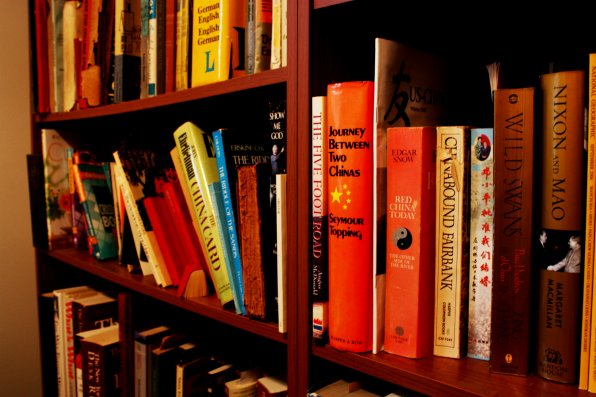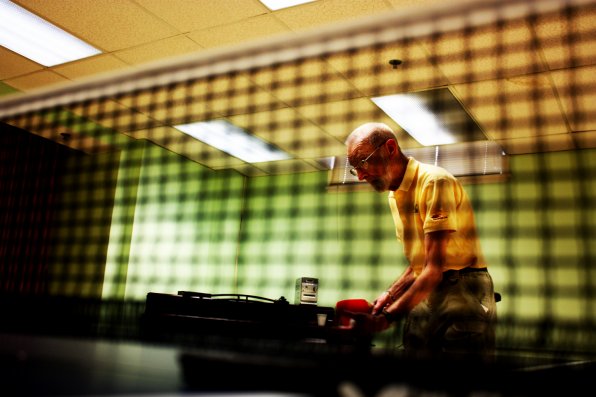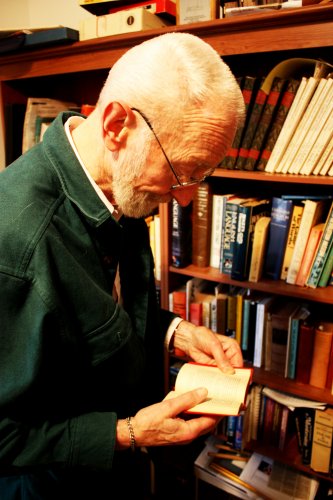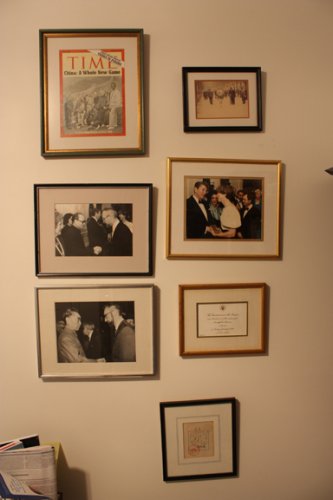Rufford Harrison has always been most comfortable around the sport of table tennis.
He first picked up a racket while attending high school in England, and has worn several hats – player, official, organizational president – during his decades in the game. The sport led him to China for the fabled Pingpong Diplomacy movement in 1971, and for all his contributions he was ultimately inducted into the United States Table Tennis Association Hall of Fame in 1984.
Despite that dazzling resume, though, Harrison's comfort alongside a table has never been more meaningful than it is now, at age 82. He admittedly doesn't play as often as he did during his youth, but each game accomplishes something no therapy or drug has been able to – the elimination, if only for a few precious moments, of any evidence of the Parkinson's Disease he battles on a daily basis.
“I suppose I feel more in control of myself,” Harrison said of his time at the table. “I'm not as consistent as I used to be, but it feels good.”
It looks pretty good, too. Harrison hosted neighbor Stephen Fulk for a friendly game Friday afternoon and indeed looked sturdy, serving and returning without a hint of struggle. He was complimentary of Fulk whenever a good shot got the better of him, but also found the old swagger on occasion, playfully jabbing Fulk with a “take that” after Harrison won a particularly long rally.
“I think he's very kind to me,” Fulk joked, guessing that Harrison doesn't unleash 100 percent of his talents. “I just enjoy the action. He's very affirmative, very encouraging. If I have a good shot, he always recognizes that.”
Harrison's beginnings in the sport are humble, as he dabbled as a player in high school and college before he “quickly realized the best seat from which to view table tennis was the umpire's chair.”
Aware that he wasn't destined for greatness as a player, Harrison became a qualified umpire in England and later started an umpire's program in the United States, becoming chairman of the group.
“I didn't stop playing, but I didn't get any better,” Harrison quipped in his dry British accent. “They say those who can, do, and those who can't, teach. I'd rephrase it to those who can, do, and those who can't, officiate.”
Humble beginnings quickly gave way to an esteemed career that would guide him into an historic international visit and, years later, a visit to the White House where he would share the dance floor with President Reagan and rub elbows with the likes of Burt Reynolds and Henry Kissinger.
The first step on the journey was Harrison's election as president of the USTTA, a position he held for four years before opting not to seek re-election. He was instead elected Recording Secretary while also becoming chairman of both the Equipment Committee and the International Committee.
It was his leadership role with the International Committee that cemented Harrison as a figure in table tennis history, for it was he who received the initial invitation for the United States team to join what would become known as “pingpong diplomacy.”
“They didn't give us an invitation on the first encounter. I remember the exact words were, 'Mr. Harrison, how would you react to an invitation for your team and officers to visit China,' and I felt like jumping up and down with glee and saying, 'Gee whiz bang, let's do it.' But I felt a calmer response more appropriate.”
The United States team was in Japan at the time of the invitation, taking part in the 1971 World Championships, and headed to China in the days thereafter. The trip came months after President Nixon lifted the restriction on travel to China, making the table tennis team the first to complete a sports exchange to the country in 22 years.
The first thing the players received upon arrival was culture shock.
“Nothing was the same (as we were used to),” Harrison said. “When we first met people, they all had identical clothes, either dark blue or drab green baggy trousers, floppy jackets, the same haircut, the same floppy hats. It was almost difficult to distinguish the men from the women. The streets were all devoid of traffic, except for bicycles, of which there were millions.
“As we flew in, all we could see was one-story drab brown houses. If you do the same thing today, as far as the eye can see, what you see is Manhattan.”
International adjustments aside, the team's reception was more than favorable. Harrison said they spent most of their time with other table tennis groups, sharing a hotel with teams from other countries that included Venezuela, England and Canada.
“We were treated like royalty,” Harrison said.
The journey would earn Harrison and the team members yet another lasting memento of the visit's impact – an appearance on the cover of Time magazine.
Harrison still has the magazine cover on the wall of his home at Havenwood Heritage-Heights, his own image slightly obscured by glue residue from the subscription sticker unfortunately placed over his likeness.
That cover hangs inches from a photograph featuring Harrison shaking the hands of Chinese dignitaries and yet another showing his wife, Marty, in a pleasant encounter with President Reagan.
The latter is a result of a 1984 visit to the White House, as Harrison's contributions to U.S. table tennis and pingpong diplomacy earned him and Marty an invite to a State Dinner in January.
It was there that Reynolds and Kissinger were part of a varied and distinguished crowd of about 120, and there that Harrison still humorously laments a golden opportunity gone by the boards.
“I remember being on the dance floor with Ronald Reagan and about three other couples, and I've often thought that I missed a great opportunity there to tap Reagan on the shoulder and ask if he'd like to trade partners. But I didn't.”
Harrison's involvement in table tennis has remained steady even as he moved around the country, from Niagara Falls, where he settled for three years after moving from England, to Wilmington, Del., where he spent the bulk of his four-decade career as a chemist for Dupont.
Harrison would eventually retire to a serene setting on a lake in the town of Washington, New Hampshire, before moving to Havenwood with Marty. He is still a contributing consultant to the USTTA on equipment issues, and was intimately involved in the decision years ago to increase the size of the ball from 38 millimeters to 40. That decision was made in hopes of slowing an increasingly fast and powerful game, and Harrison said he doesn't like the modern focus on strength over strategy, preferring the longer rallies more prevalent years ago.
Harrison now cherishes the rallies he can still take part in. He admittedly never had a pingpong table in any of his houses, but makes occasional use of the one in the activity room at Havenwood.
It is there that he has found a way to remain involved in the game that once solidified his legacy and now provides a respite from mental and physical challenges.
“It's something I'm thankful for, certainly,” Harrison said. “I used to do a lot of sailing, but I haven't done that since I came to New Hampshire. I've given that up. I'm probably going to give up singing. My singing voice held up better than my spoken voice, but my range is only half of what it used to be.
“I've given up quite a lot. But not table tennis.”












